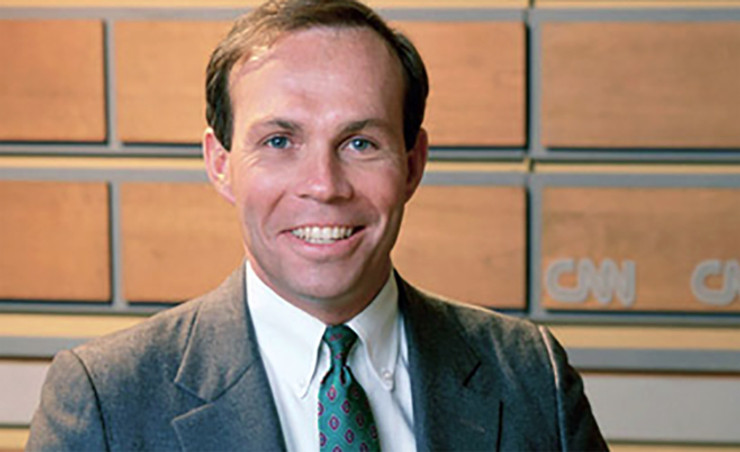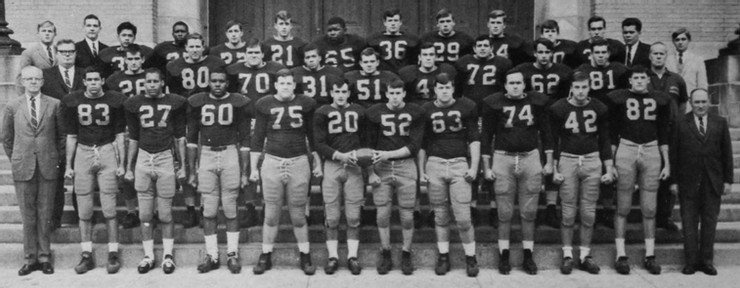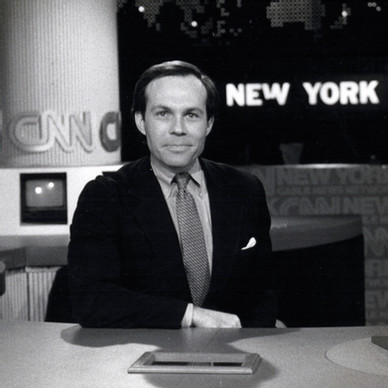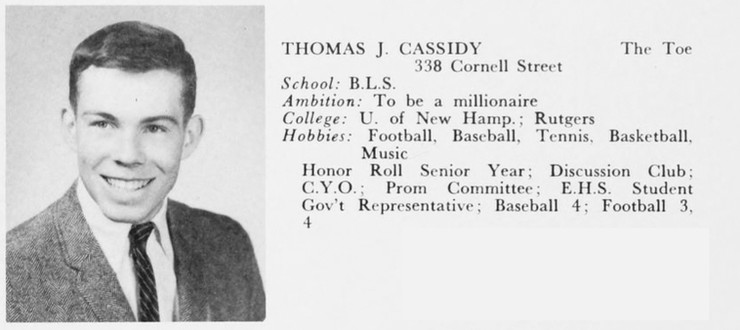EHS Notable Alumni
Thirty Years On, English High Remembers Tom Cassidy ’67 – A True Pioneer and English High Graduate

EHSA President, Mike Thomas was a classmate, teammate and best friend of Tom Cassidy. Thirty years after Tom’s passing, here is how he remembers his good friend:
Tom was someone who when you spoke to him, he listened like you were the only person in the room. His listening skills were his best asset next to his learning to talk the universal language of television, with a non-Boston accent. He was like another brother to my family of seven brothers, eight boys in all. My entire family loved Tom and he loved being amongst the Thomas family for all sort of activities, sports being high on our lists. He and my mother, Gladys, had a special relationship; she treated Tom like her 9th son.
On the front steps of my home in West Roxbury, I remember long career, college path conversations. We talked of girlfriends, colleges and leaving families, etc. One thing I always remember was Tom’s focus on his career. He always said he wanted to be famous and/or wealthy. He achieved both!
Our best English High School achievement was his catching the winning touchdown pass from me in the English vs. Latin Thanksgiving Day game in 1966 to ensure our undefeated season, 7-0-1. It was an adjusted pass route where I told him to deke the defender, I did a pump fake, then run down the sidelines. Tom ran the route, caught the pass, eluded several tacklers for a first half TD which held up as the game winner. The play was mostly Tom’s run after the catch that made the play…in retrospect what a wonderful experience to have had with a best friend.

EHS 1966 Championship Team. Tom Cassidy is #81, second row right.
Tom was a 1972 graduate of Bowdoin College and received a joint Master’s degree from Columbia University in finance and journalism. His allegiance to Bowdoin College is evidenced by his ‘lecture series’ he eventually endowed later in his career. He tapped friends from the journalism world such as Lou Dobbs and Stuart Varney to lecture.
He is the finest person I’ve ever known. To this day I miss his advice. No doubt in my mind, if alive, he’d be at the forefront of English High’s 200th Anniversary parade.
 Tom Cassidy, ’67 was a Boston native who, like many English alumni, grew up in modest circumstances, a Boston housing project, but achieved a great deal in life. And in the case of Tom, it was a life tragically cut short when he passed away in 1991 at the age of 41 from complications of AIDS. He was a true, courageous pioneer. He was also gay.
Tom Cassidy, ’67 was a Boston native who, like many English alumni, grew up in modest circumstances, a Boston housing project, but achieved a great deal in life. And in the case of Tom, it was a life tragically cut short when he passed away in 1991 at the age of 41 from complications of AIDS. He was a true, courageous pioneer. He was also gay.
After college, he began his broadcasting career in 1978 as a reporter and anchor for KEZI-TV in Eugene, Oregon. He then moved to KGO-TV in San Francisco. In 1981 he joined CNN which had been founded a year earlier by Ted Turner. CNN was the first 24-hour news channel which meant Tom had the opportunity to define a new way of reporting the news. The next year, he founded the network’s notable “Pinnacle” program, a weekend show about business leaders.
Tom’s excellence as a journalist set a high standard for CNN. On Black Monday, October 19, 1987, when the Dow Jones crashed by 22%, Tom lead the financial reporting on CNN. Using the then-new platform of 24-hour news, he maintained a sense of national calm while traditional networks stirred fear by blasting Special Reports. That same day, Tom learned of his positive AIDS diagnosis.
Tom knew the “rules of the closet.” As he built his career from local TV reporter to CNN business news anchor and host of that network’s “Pinnacle” series, Tom kept his gay life and his professional life strictly separate. And then he found out he was going to die.
Unlike some gay men diagnosed with AIDS whose high-profile careers led them to disappear from public when they became seriously ill, Tom chose the opposite course.
In 1990, Tom went public on New York area television with his diagnosis, treatment and progress – including revealing his diagnosis to his family on camera. In 1991, to go public with his HIV status and also reveal his gay identity, was a ground-breaking action.
“I wanted to do some good.” he said in an interview. I really wanted to make a political statement as a gay person, as well as an AIDS patient. I thought I could make AIDS patients feel better. I could make the public understand that some of their TV newsmen are gay and sick. Everyone identified me as one of the good guys, and there are millions of people who have seen me on television. I wanted them to know that a favorite of theirs could get this disease—and, secondarily, that he happened to be gay. I also thought that maybe I could help show people that AIDS is not just a gay problem. When gay people die of AIDS, the whole society is so much poorer.”
The English High School Alumni Association salutes Tom Cassidy’s honor, achievement and pioneering courage.

